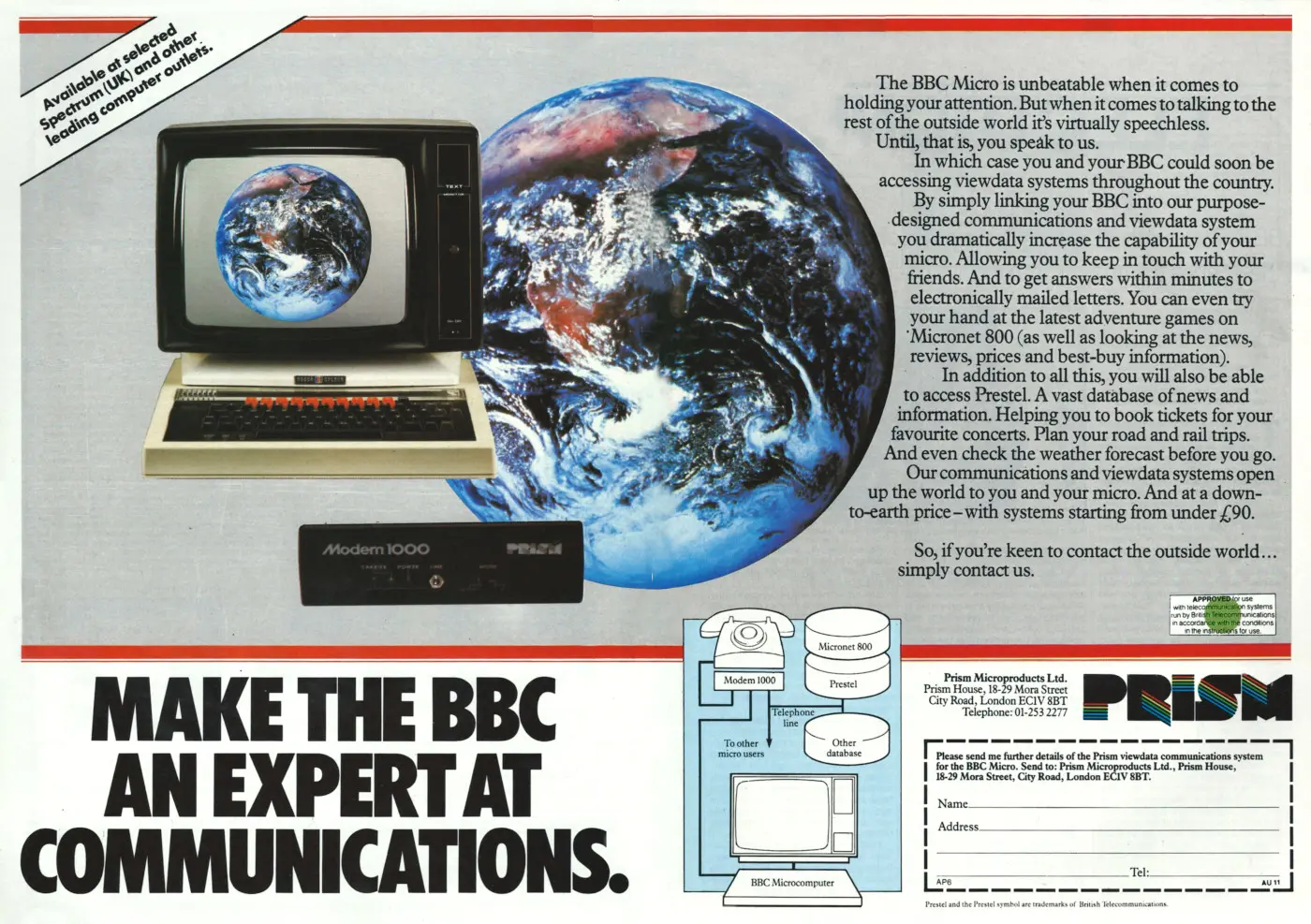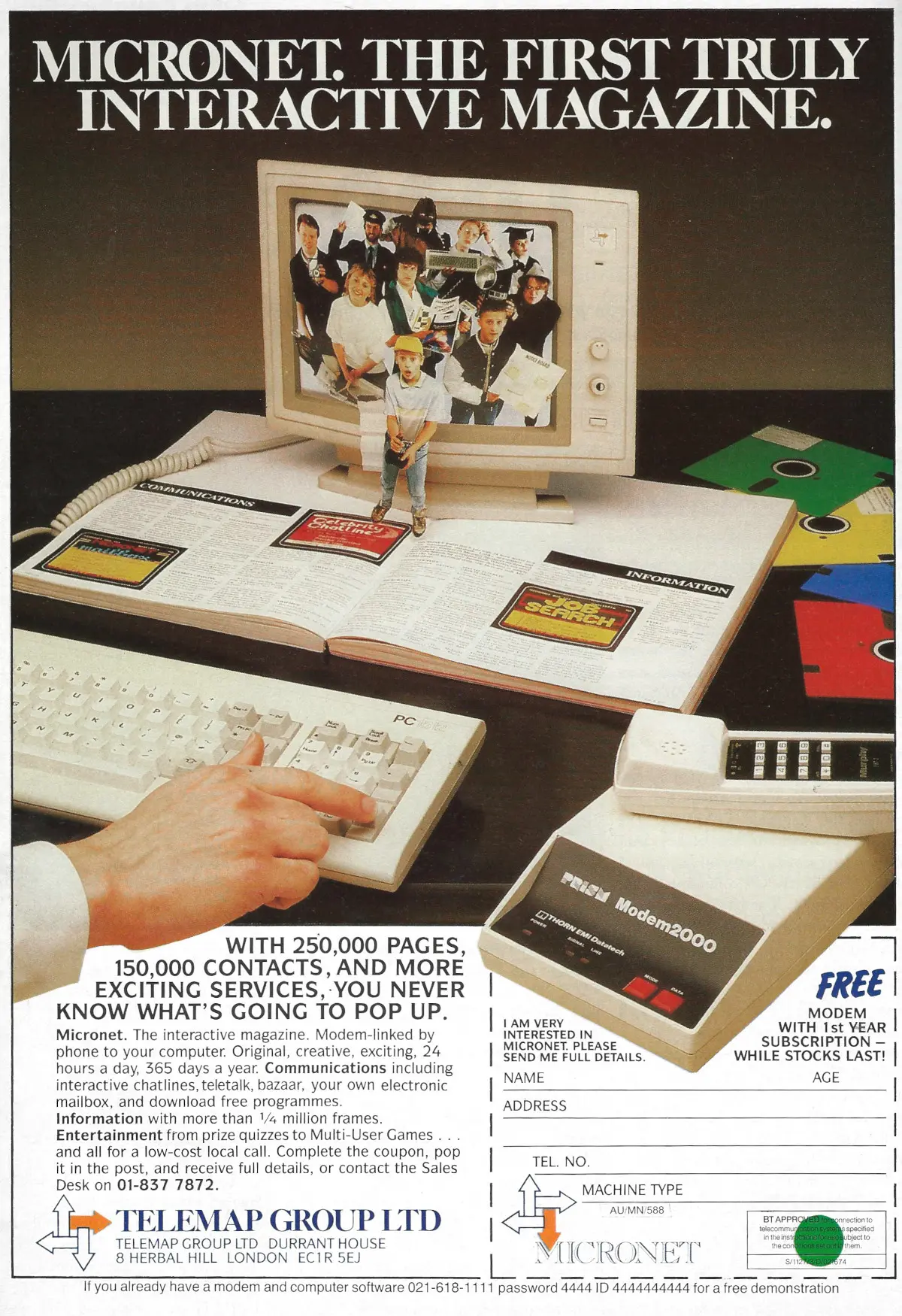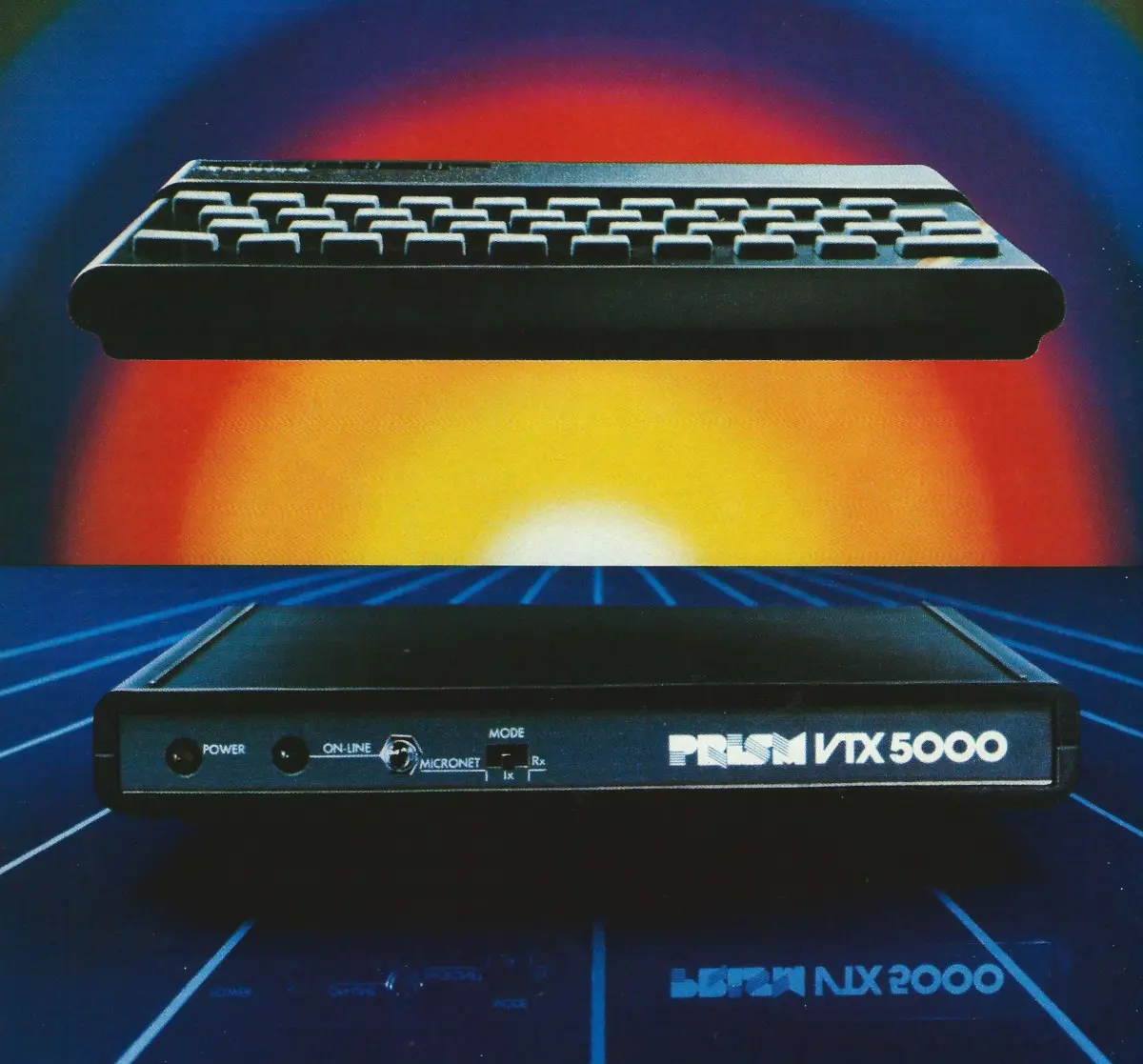
Prism Advert - November 1984
From Acorn User

Make the BBC an expert at communications
Prism was an interesting company that, although not hugely famous by itself, had a hand in all sorts of areas of the UK microcomputer industry.
It started out life as the sole distributor for Sinclair's ZX81 and the Spectrum, although it eventually lost exclusivity in May 1984[1]. It got the gig only seven weeks after it had been founded.
It even suffered a theft of 3,000 Spectrums from one of its deliveries in June 1983[2], although this didn't seem to affect its good reputation for after-sales support to its dealers.
Prism then branched out into producing cassette-based software for the ZX81 in October 1982.
Its range included titles from other leading software developers because Prism had been actively touting for programs from other companies to sell, as it had access via its distributor network to a large number of outlets that many software companies could not normally reach.
As Bob Denton, Prism's MD said "it is no longer mail-order, it is retail. We have written to everybody who, as far as we know, has produced material for the ZX81 and many have submitted samples to us. Any software passing our quality assesment will be included to augment the Sinclair catalogue"[3].
Earlier in 1982, Prism's Bob Denton launched a Prestel-based electronics magazine called Electronics Insight. He subsequently met Richard Hease, the owner of ECC - the publisher of Educational Computing - whereupon the two realised their shared interest in Prestel networks.
In June 1982, ECC sold some of its titles to East Midland Allied Press, or EMAP. EMAP's Prestel division, known as Telemap Group, bought up Electronics Insight and the two systems went on to form the basis of popular dial-up Viewdata service Micronet 800 - the 800 being the page number in Prestel where the service was originally located[4].

An advert for Micronet, selling it as an interactive magazine and featuring Prism's Modem 2000 - built by Thorn EMI Datatech - which was free with a subscription. The keyboard in the advert is that of Amstrad's PC1512. Curiously, Micronet seems to have dropped its own branding and become a product of Telemap Group only - possibly because Prism had gone bust a few years before this advert. From Acorn User, May 1988
Micronet rapidly became Prestel's most popular section, with 90,000 members at its peak. It recorded one million page accesses in a single month in 1983[5].
As a natural progression, Prism branched out into producing modems to support the Micronet 800 service. These included the VTX5000, which was developed specifically for the Sinclair Spectrum, and the general-purpose Modem 1000, as seen in the main advert at the top of the page.

Prism's VTX5000, custom-designed for the Sinclair Spectrum. From Personal Computer News, 1st September 1983
Prism's VTX5000 was quite significant for Spectrum users. Reviewing it in Personal Computer News, John Lettice summed up:
"if the Prism does the same for other micros, the acoustic modem would certainly seem to be on the way out, and as far as the Spectrum is concerned the VTX5000 represents a giant step. It isn't simply a tool for letting the machine be used with Micronet - it's a route out in to the big wide world and it will at least start the Spectrum off in the direction that micros will be taking through the home information revolution"[6].
At the beginning of 1984, the company had started selling robots. These included the $1,595 Topo which retailed in the UK at the same face value - £1,500, or around £6,330 in 2025 - and which was built by Atari co-founder Nolan Bushnell's company Androbot[7].
It was also selling the more budget-friendly Movits, which Prism's Director of Developments described as "The modern guy's Lego" before going on to say that "This is really a 'fun' range of robots and a lot of the entertainment and educational value comes from assembling the kit"[8]
In the summer of 1984, Prism then dabbled with the electronic distribution of software, when it acquired the UK rights to the Romox system which had been trialled in the US.
This involved "retail modules" installed in individual shops connected to a central host computer from which customers could download software of their choice to either cassette, floppy disc or even cartridge.
At the end of 1984, Prism took its next obvious step and - in a joint venture with Transam Microsystems - produced and distributed its own computer - the Wren Executive System.
The Wren was a "luggable" portable built for it under contract by Thorn/EMI. Perhaps unsurprisingly, it came with a built-in modem for access to Prestel and Micronet 800.
Only 1,000 Wrens were produced, and the joint venture went bust in 1985.
Prism itself also went bust at the beginning of 1985, a move partly triggered when it lost its big distribution contract when Sinclair moved back to direct sales. Prism's Richard Hease also admitted that the company had over-stocked software and modems.
Another ex-director of Prism also said:
"I think what went wrong was just that Bob Denton and Richard Hease had one profitable activity, which was Spectrum distribution, [but] I think they kept trying other daft ideas like the Romox software distribution scheme and the merchandising of software and robots, which didn't make money".
Date created: 22 January 2024
Last updated: 11 December 2024
Hint: use left and right cursor keys to navigate between adverts.
Sources
Text and otherwise-uncredited photos © nosher.net 2025. Dollar/GBP conversions, where used, assume $1.50 to £1. "Now" prices are calculated dynamically using average RPI per year.